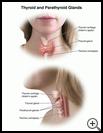
Hyperthyroidism (High Thyroid Level): Brief Version
________________________________________________________________________
KEY POINTS
- Hyperthyroidism happens when your thyroid gland makes too much thyroid hormone. Thyroid hormones are chemicals that control the way your body turns the food you eat into energy. They also control body functions like temperature, heart rate, and appetite.
- Treatment may include medicines, radiation therapy, surgery, or a combination.
- Follow the full course of treatment prescribed by your healthcare provider. Don’t stop taking your medicine or change the way you take it unless your provider tells you to.
________________________________________________________________________
What is hyperthyroidism?
Hyperthyroidism happens when your thyroid gland makes too much thyroid hormone. Your thyroid gland is in the lower front of your neck. Thyroid hormones are chemicals that control the way your body turns the food you eat into energy. They also control body functions like temperature, heart rate, and appetite.
What are the symptoms?
You may:
- Feel nervous and anxious
- Have trouble sleeping
- Feel tired or weak or shaky
- Lose weight
- Notice that your neck is swollen because your thyroid gland is swollen.
You may have other problems. Here are some of them:
- Your eyeballs may stick out.
- You may have diarrhea.
- Your heart may beat fast.
How is it treated?
If you have too much thyroid hormone, you may need:
- Medicine to help your symptoms and to help your thyroid gland make fewer hormones
- Radiation to kill the thyroid cells that are making too much hormone
- Surgery to take out all or part of the thyroid gland
How can I take care of myself?
- Don’t stop taking your medicine or change the way you take it unless your provider tells you to.
- Go to all of your checkups.
- Get blood tests when your healthcare provider says you should.
- Don’t smoke. Smoking can make eye problems worse. The treatment may work better if you don’t smoke.
Ask your healthcare provider:
- How long it will take to get better
- What things you should avoid
- How to take care of yourself at home
- What problems you should watch for and what to do if you have them
Make sure you know when you should come back for a checkup.
Developed by RelayHealth.
This content is reviewed periodically and is subject to change as new health information becomes available. The information is intended to inform and educate and is not a replacement for medical evaluation, advice, diagnosis or treatment by a healthcare professional.
Copyright © 2016 RelayHealth, a division of McKesson Technologies Inc. All rights reserved.

